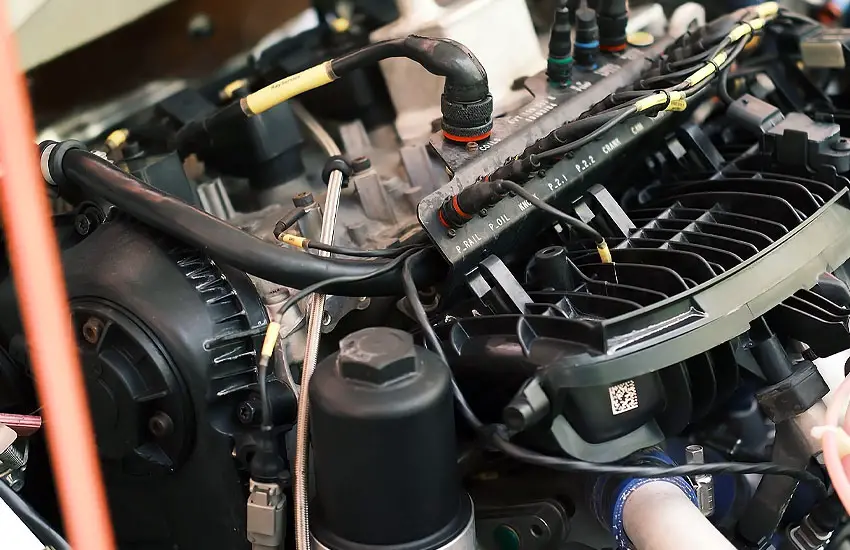As an Amazon Associate, I earn from qualifying purchases at no extra cost to you.
How to Identify a ZZ4 Engine: The Ultimate Guide
Engines are the heart of any vehicle, and knowing which engine powers your car is crucial for maintenance, repairs, and upgrades. If you’re a car enthusiast or a mechanic, you've probably heard of the Zz4 engine. But how do you identify it among all the different engine types out there? Whether you’re working on a project car or simply trying to understand more about your vehicle, learning how to identify a Zz4 engine can help you make informed decisions. In this post, we’ll guide you through the process of identifying a Zz4 engine, its key features, and the important things to look for.
What is the Zz4 Engine?
The Zz4 engine is a high-performance engine produced by General Motors (GM), part of their popular small-block V8 family. It is a crate engine, meaning it's sold separately from the vehicle, designed to offer a reliable and powerful solution for both street and racing cars. GM introduced the Zz4 as an affordable and more modern alternative to older small-block engines, offering improved durability and performance. The Zz4 engine, available in various configurations, has become a favorite among gearheads and professionals for its power, reliability, and ease of customization.
Understanding the Zz4 engine's features is essential before diving into how to identify it. Some key characteristics include:
- Displacement: Typically, the Zz4 engine has a 350 cubic inch (5.7L) displacement.
- Horsepower: It produces approximately 355 horsepower.
- Fuel system: Most Zz4 engines come with a sequential fuel injection system.
- Construction: The Zz4 engine is built with high-performance components, including aluminum cylinder heads, a forged steel crankshaft, and more.
When you’re trying to identify a Zz4 engine, you'll want to focus on its unique features and markings. Let's explore the process step by step.
How to Identify a Zz4 Engine: Key Features to Look For
To identify a Zz4 engine, there are several areas you’ll need to focus on. These include the engine block, the casting numbers, and the serial number, as well as specific components like the heads and intake manifold. Here’s how you can break it down:
1. Engine Block and Casting Numbers
The first place to start when identifying any engine is the engine block itself. GM's Zz4 engine typically has distinctive features on the block, including casting numbers. These numbers tell you the origin, model, and specifications of the engine. When looking at the block, check the following:
- Casting Number Location: For a Zz4 engine, the casting number is usually located on the side of the block, near the starter or behind the cylinder head. This number is crucial as it provides the first clue about the engine's identity.
- Casting Number Codes: Look for codes like “ZZ4” or numbers that correspond to this specific engine model. The Zz4 will typically have a specific casting code that differentiates it from other small-block V8 engines.
2. Serial Number
In addition to casting numbers, the serial number is another important identifier. Every engine produced by GM has a unique serial number. This number can be found on the front pad of the engine, near the timing cover.
- Location of the Serial Number: You'll typically find the serial number stamped into the block, either on the passenger or driver side of the engine. It's often located near the timing chain cover or the front of the engine block.
- Decoding the Serial Number: Once you've located the serial number, you can decode it using various online tools or GM's official databases. This number will help you confirm the exact engine specs, including whether it's a Zz4 engine or another variation of the small-block.
3. Cylinder Heads and Valve Covers
Another important part of identifying a Zz4 engine is examining the cylinder heads. Zz4 engines are known for their aluminum cylinder heads, which are often different from the cast iron heads used in older small-block engines. Here’s what to look for:
- Aluminum Heads: The Zz4 uses aluminum heads, which are lighter and provide better cooling than cast iron heads. If you see aluminum heads, it’s a good sign that the engine is likely a Zz4.
- Head Casting Numbers: Like the engine block, the cylinder heads will have casting numbers. These numbers often include the code “ZZ4” and can be found on the top of the heads or near the valve covers.
4. Intake Manifold and Carburetor
The intake manifold is another giveaway. Zz4 engines are equipped with a performance-oriented intake manifold designed for efficient airflow. It is important to examine the manifold to identify its specific design:
- Intake Manifold Design: Zz4 engines come with a high-performance aluminum intake manifold, which typically features a four-barrel carburetor. The design of the intake manifold can be quite distinctive when compared to stock manifolds from older engines.
- Carburetor or Fuel Injection: Some Zz4 engines are carbureted, while others use fuel injection. The Zz4 engine typically has a modern sequential fuel injection system, which sets it apart from older engines that rely on carburetors. Look at the top of the intake manifold to see if there is a carburetor or an EFI (electronic fuel injection) system.
5. Other Identifying Features
There are also a few additional features you can check to confirm if you're dealing with a Zz4 engine. These include:
- Crankshaft: Zz4 engines are often equipped with a forged steel crankshaft. This provides extra strength, especially for high-performance use.
- Timing Chain Cover: The timing chain cover on a Zz4 engine will often have unique markings or a distinct shape. It’s another area to check if you’re trying to confirm the engine type.
I Hope This Helps! Identifying a Zz4 engine is an essential skill for anyone who works with or owns a vehicle powered by this popular small-block V8 engine. By focusing on the engine block, casting numbers, serial numbers, and specific components like the intake manifold and cylinder heads, you can confirm whether you're dealing with a Zz4 engine or another type.

Common Myths About the Zz4 Engine
When identifying a Zz4 engine, there are a few common myths that might cause confusion. Let's go over some of them to ensure you don't misidentify your engine.
1. It's the Same as a Standard Small-Block V8
One of the most common myths is that the Zz4 is just a regular small-block V8. While it shares some similarities with older small-blocks, the Zz4 has several upgrades that set it apart. For example, it has a more advanced fuel system and different cylinder heads. It also has higher horsepower ratings, making it a more performance-oriented option.
2. All ZZ4 Engines Are the Same
Another misconception is that all Zz4 engines are identical. In reality, GM offers different configurations of the Zz4 engine, with slight differences in performance and setup depending on whether it's being used for street or racing applications.
3. ZZ4 Engines Are Only for Racing Cars
While it's true that many Zz4 engines are used in race cars, they are also a popular choice for street cars. The Zz4 provides a balance of power, performance, and reliability, making it suitable for everyday driving as well.
Common Uses for the Zz4 Engine
The Zz4 engine is popular in various types of vehicles, both for performance enthusiasts and everyday drivers. It's often used in:
- Hot Rods and Custom Cars: The Zz4 engine is frequently found in hot rods, where its power and reliability are highly valued. It provides a modern, high-performance option for custom car builds.
- Chevrolet Vehicles: Many Chevrolet models, especially older ones, are equipped with Zz4 engines for performance purposes.
- Racing and Track Cars: Due to its powerful performance, the Zz4 is a common engine choice for cars built for track racing and drag racing events.
Are These Questions in Your Mind?
Here are some frequently asked questions that may help clarify any doubts you have:
Is it possible to identify a Zz4 engine by its sound?
Yes, the Zz4 engine has a distinctive sound, especially when revving at high speeds. The sound is often described as deeper and more aggressive compared to standard small-block V8 engines.
Can the Zz4 engine be used in vehicles other than Chevrolets?
Yes, the Zz4 engine can be used in various vehicles, as long as the engine bay can accommodate its size and power output. Many car enthusiasts swap engines in different makes and models for performance upgrades.
Do I need special tools to identify a Zz4 engine?
Identifying a Zz4 engine mainly requires visual inspection of key engine components, so standard tools like wrenches and flashlights will usually suffice for checking the casting and serial numbers.
Is the Zz4 engine suitable for daily driving?
Yes, the Zz4 engine is a versatile option, offering reliable performance for both daily driving and performance use, making it popular for street cars as well as hot rods and race cars.
Can I install a Zz4 engine myself?
If you have the right tools and mechanical knowledge, installing a Zz4 engine can be a feasible DIY project. However, it is recommended to have a professional mechanic assist with installation if you’re unsure.
Is the Zz4 engine compatible with modern fuel systems?
Yes, the Zz4 engine is designed to work with modern fuel systems, including electronic fuel injection (EFI), which ensures efficient performance and better fuel economy.
Do I need to modify my vehicle to fit a Zz4 engine?
Depending on the vehicle, you may need to make certain modifications to fit the Zz4 engine, such as adjusting the engine mounts or upgrading the fuel system.
Is the Zz4 engine more expensive than other small-block V8 engines?
Yes, the Zz4 engine tends to be more expensive than other small-block V8 engines due to its enhanced features, performance capabilities, and modern design.
Can I upgrade a standard small-block V8 engine to a Zz4 engine?
Yes, many car owners choose to upgrade from an older small-block engine to a Zz4 engine for improved power and performance. However, this may require modifications to the engine bay and other components.
Is the Zz4 engine reliable for long-term use?
Yes, the Zz4 engine is known for its reliability, especially in high-performance applications. With proper maintenance, it can serve as a long-lasting power source for various types of vehicles.





